On January 25, people in Greece will go to the polls. But this is no ordinary election. The situation in Greece is being widely watched because the election could be won by SYRIZA, a left-wing party pledged to end the austerity measures that have caused such harm in the country since 2010.
By David Bush
At the end of 2014, RankandFile.ca, an online labour news publication, ran a competition for Scumbag of the Year. While we received many nominations of bad bosses and terrible politicians from across the country, unsurprisingly it was Stephen Harper who topped our readers’ list to win this prestigious award.
By Stephen D’Arcy
Strikes are only one form of struggle, and perhaps less and less important as the years pass. But the disappearance of strikes — documented in the accompanying graph — is not an anomaly. It reflects a pattern of diminishing overall levels of oppositional social mobilization. Although there aren’t (as far as I know) statistics on it, it is obvious that levels of social struggle generally, in the Canadian state, are lower now than at any time since written records have been kept.
By Salmaan Khan
As election day draws nearer, the race for Toronto’s Mayoral seat has narrowed down to three out of the initial 65 registered candidates. Benefiting from selective corporate media exposure, John Tory, Olivia Chow and Rob Ford have managed to build themselves campaigns that regurgitate many of the same vague promises: less traffic; greater accountability; transit relief; tackling youth unemployment; supporting businesses; and of course, talking taxes. The obsession with tax rates has become so normalized that even the “progressive” alternative has found it a useful mantra as all three candidates clamor for votes.
Image source: hindustan times
This is Part 3 of an interview with Himani Bannerji by New Socialist Editor Salmaan Khan on the outcome of the Indian elections. This final portion of the interview focused on the Communist Party of India (Marxist) (CPI[M]) which fared poorly in these past elections, securing only nine seats out of 97 candidates – a progressive decline from the last two national elections and the lowest since the formation of the party in 1964 – followed by a discussion of the difficulties that come with organizing people according to a formula derived from outdated and inappropriate conceptions of industrialization and capitalist development. Part 1 of this interview, “India and the Rise of Religious Nationalism,” is here. Click here for Part 2, “Masculinity, Islamophobia and Neoliberal Politics in India.”
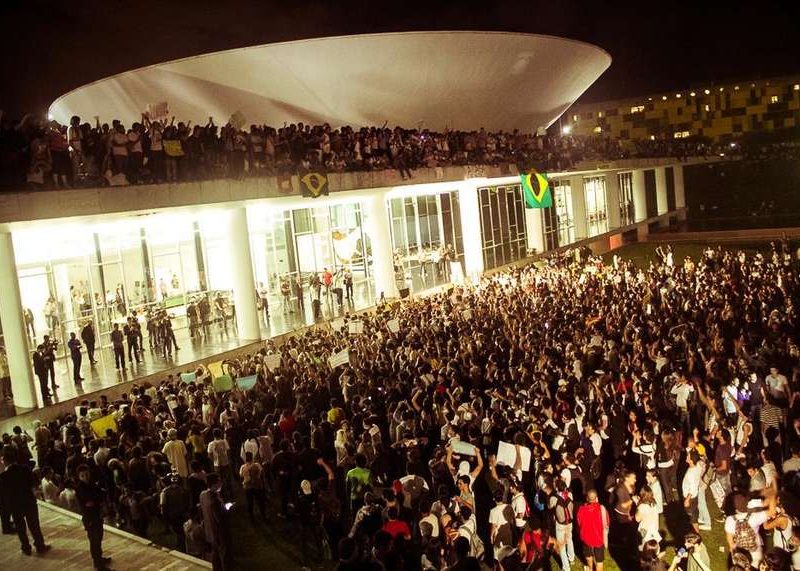
By Sabrina Fernandes
Rally held in June 2013, Brazil. Source: MidiaNinja media collective
The general commentary regarding Brazilian politics is that the “politicians are all the same” or “there is no political alternative” and that even the good ones get corrupted once they reach power. It is no wonder then, that the massive protests of June 2013 throughout Brazil, which were filled with diffuse voices and eclipsed by broad demands, revealed what many termed a crisis of representation.
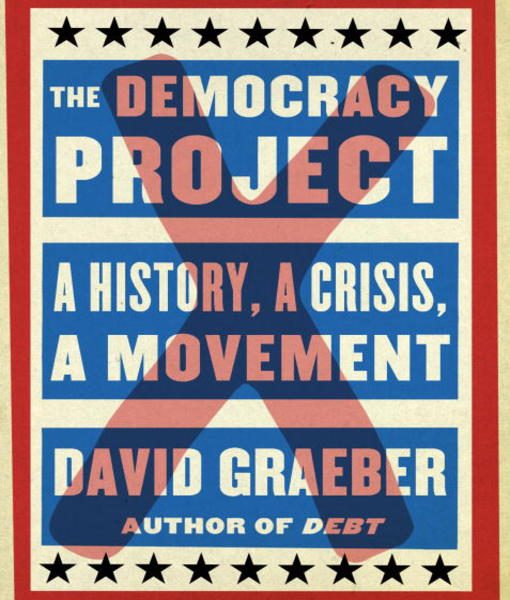
By Brian S. Roper
Review of David Graeber, The Democracy Project: A History, a Crisis, a Movement (Allen Lane, 2013)
Was the Occupy movement an anarchist movement? David Graeber certainly thinks so and dedicates much of The Democracy Project depicting it in these terms.
In reality the influence of Anarchism as a diverse political current was highly uneven across the hundreds of occupations that took place globally in September, October and November of 2011. The relative influence of anarchists, socialists, feminists, Indigenous activists, greens, social democrats, left nationalists, and others varied largely according to the relative strengths of these currents prior to the emergence of the Occupy movement, and how they conducted themselves during the course of the encampments.
By Alan Sears
These are challenging times for the anti-capitalist left. Despite the enormous attacks being waged in the name of austerity, there is little in the way of sustained resistance in the streets, workplaces, neighbourhoods or schools. The Left’s limited resources are being strained to the limits in struggles to organize against the tide.
By Dru Oja Jay
Across Canada, movement organizations are preparing for the People’s Social Forum, coming up in August. There’s a buzz of excitement and anticipation in the air as committees elect delegates, and strategies are debated. When hundreds of activists gather in Ottawa in a few months, we will be drawing from a rich, long-simmering cauldron of theoretical discussion and insight issuing from astute on-the-ground observations.
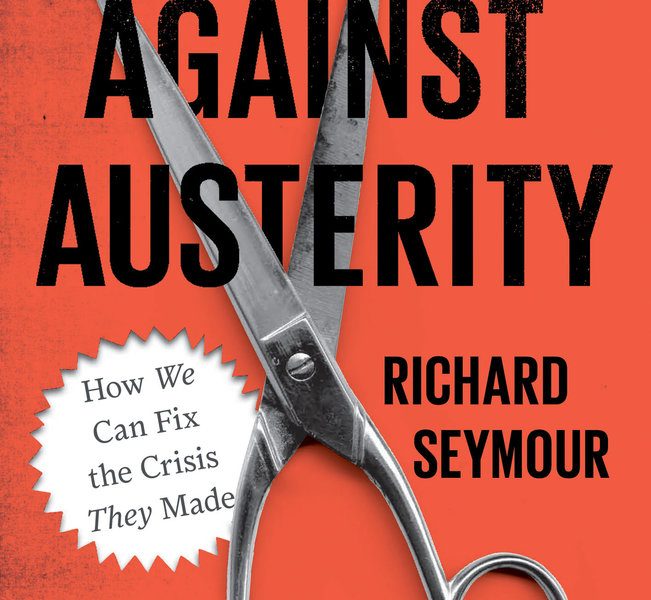
By Alan Sears
Review of Richard Seymour, Against Austerity: How We Can Fix the Crisis They Made (Pluto Press, 2014)
Richard Seymour’s new book is an unflinching and insightful analysis of the current situation in which the radical left finds itself. These are hard times for radicals in Northern Europe and North America. You would think this would be a period of mass radicalization, given the glaring inequality being produced by blatant attacks on social programs, wages, migrants’ rights and job security. Yet there are few effective fightbacks, and activist circles in some places are actually getting smaller.
By Jeremie Bedard-Wien and Alain Savard
Two years after the defeat of the Charest government, Quebecers have chosen to give a strong mandate to the Liberals (PLQ). As a backdrop, a dramatic election campaign saw the Parti Québécois (PQ) rise and fall precipitously. What lessons should progressives draw from the re-alignment of the Quebec electoral map?
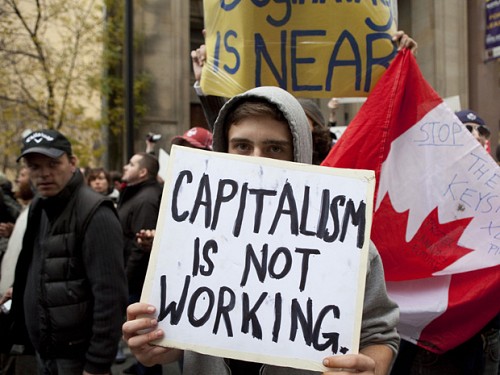
By David Camfield
This article was first published by Canadian Dimension as part of a series of online viewpoints about challenges and prospects for the left.
Derrick O’Keefe recently wrote in a piece on the Canadian Dimension magazine website that “beyond some very marginal formations and small publications, the left is missing. It’s just not there, organizationally.”
By Harold Lavender
Review of Sasha Lilley (ed.), Catastrophism: The Apocalyptic Politics of Collapse and Rebirth (PM Press, 2012)
Images and talk of catastrophes are pervasive in today’s world. Much discussion of the subject ignores issues of social justice and is not very favourable to a left-wing perspective. Yet the spectre of catastrophic climate change haunts the future. Climate change is wreaking destruction on many, is getting worse and poses a potential threat to life on the planet. This raises many serious questions about how the Left should respond.
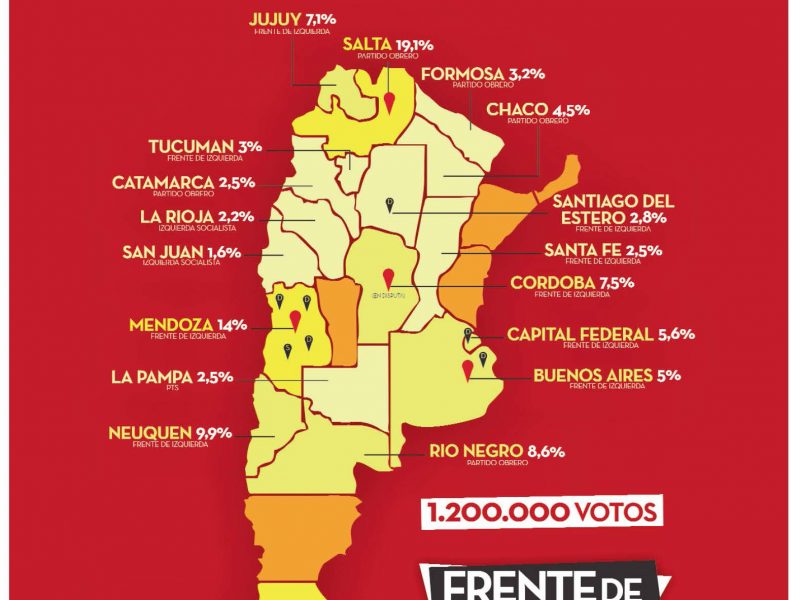
By Bob Lyons
The historic Argentinean mid-term elections of 27 October resulted in a breakthrough for the revolutionary left, and has exposed more clearly the outline of the tendencies emerging at the time of the primary votes held in July. The political, economic and social fissures revealed by the vote can be grouped around three themes:
1. the end of the Kirchnerist experiment and the resulting strategic incoherance of the Argentinean bourgeoisie as a whole;
2. the radical deepening of the economic and fiscal crises of the Argentinean state expressed as a loss of political legitimacy, and a series of policy cul-de-sacs;
3. the growing presence of a workers and social vanguard determined to resist the consequences of the global crisis as expressed locally.
In what follows we will attempt to situate the election, and especially the results for the revolutionary left, within the context of the above themes.
By Mike Gonzalez
In every revolutionary crisis the state will slip off the velvet glove to reveal the iron fist underneath; that is the nature of the beast, as Lenin reminded us. Armies are there to serve the capitalist order, whether their activity is described as “peacekeeping,” “national security” or simply the maintenance of public order.
By Jase Short
Chris Hedges is one of the most celebrated intellectuals of the contemporary US Left. A former New York Times reporter who essentially lost his job for taking a public stand against the invasion of Iraq, Hedges straddles the line between cynical doomsayer and principled critic of mainstream politics. In spite of many lapses in judgment in his intellectual work, the general thrust of his political standpoint is a welcome relief to those who have a hard time finding intellectuals who take the crises of global capitalism seriously.
Review of Social Democracy After the Cold War. Edited by Bryan Evans and Ingo Schmidt. 2012. Edmonton: AU Press.
By James Cairns
By Alan Sears
The global slump since 2008 has cast a sharp light on the glaring injustices that characterize global capitalism at every level. Yet there is a horrible gap between the perception that something is wrong and the sense we can do something about it. The greatest challenge anti-capitalists face today is to work towards closing that gap.

By DL Simmons
With the indigenous activists of Idle No More and Defenders of the Land calling to make the summer of 2013 “Sovereignty Summer” — a “campaign of coordinated non-violent direct actions to promote Aboriginal rights and environmental protection in alliance with non-native supporters” — it’s a good time to look at the relationship between indigenous struggle and radical politics. With this in mind, we are glad to publish a revised and updated version of a piece that originally appeared in the special Indigenous Resurgence issue of New Socialist in 2006.
During the peak of the Red Power movement in the late 1960s and early 1970s, many newly radicalizing indigenous people became interested in exploring various theories of revolution and socialist organization.
The editors of New Socialist Webzine recently sent the following short description of the situation in which the Left finds itself today to a number of people we respect and asked them for their thoughts. We are glad to publish four responses, from Cindy McCallum Miller, David McNally, Leanne Simpson and Cloé Zawadzki-Turcotte. We welcome additional constructive responses from readers.

